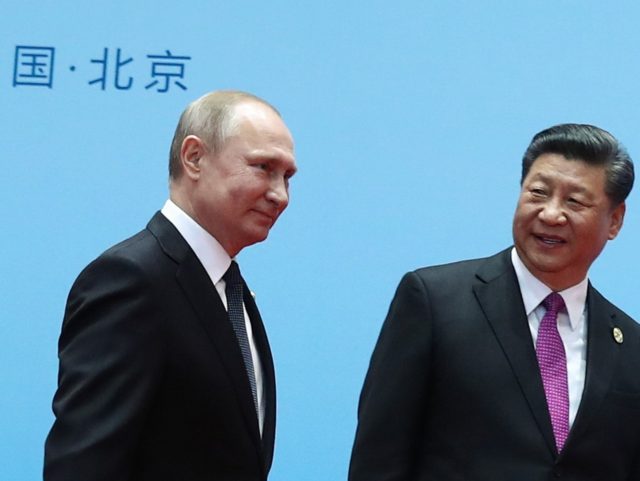President Donald Trump will send a U.S. delegation to arms control talks in Geneva this week with Russia that could lay the groundwork for a trilateral agreement including China.
The Trump administration frequently criticizes Cold War-era bilateral agreements with Russia as insufficient for the new millennium, viewing them as dangerously restrictive at a moment when the U.S. needs the flexibility to deal with new threats.
According to a Monday report by the New York Times, Trump discussed new arms control talks with Russian President Vladimir Putin on the sidelines of the G20 summit in Osaka, Japan, last month and wants to bring Chinese Communist Party leader Xi Jinping into the discussion, an invitation Xi has thus far been hesitant to accept:
The meeting comes at a fraught moment in the history of arms control between Washington and Moscow. Mr. Trump’s decision to withdraw from the Intermediate-Range Nuclear Forces Treaty of 1987, or I.N.F., on the grounds of Russian violations takes effect next month over Mr. Putin’s objections.
Mr. Trump’s team has also signaled that it is not interested in renewing the New Start treaty of 2010 that expires in 19 months despite Russia’s entreaties to keep it.
Instead, Mr. Trump’s administration argues that two-way Russian-American arms agreements dating to the Cold War are antiquated in a world where China is a rising power, although it remains unclear how committed he really is to any new accord given his administration’s skepticism of arms control.
Beijing has long argued that it maintains only a relatively small arsenal of weapons for deterrence. But the Defense Intelligence Agency estimated in May that China is “likely to at least double the size of its nuclear stockpile” in the next decade.
The U.S. State Department described the Geneva conference as an extension of talks between U.S. Secretary of State Mike Pompeo and Russian Foreign Minister Sergei Lavrov in Sochi, Russia in May.
Russia’s Tass news service quoted Russian officials who hope this week’s meeting will begin a “structured dialogue process on arms control, including on the New Strategic Arms Reduction Treaty (New START).” The Trump administration says New START needs to be substantially rewritten before it is renewed or extended in 2021.
The Geneva team will be led by Deputy Secretary of State John J. Sullivan and will include representatives from the National Security Council, National Security Agency, and Defense Department. Russia is sending Deputy Foreign Minister Sergei Ryabkov.
China is not attending this week’s meeting in Geneva and has insisted it will never participate in trilateral arms talks, although there appears to be lingering hope in Washington they will change their minds, especially if China feels its international prestige and ambition to be recognized as a great globalist power is threatened by stubbornly refusing to join the negotiations.
Chinese Foreign Ministry spokesman Geng Shuang was asked about the Geneva conference on Tuesday. He replied that since “the U.S. and Russia own the biggest nuclear arsenals in the world,” they should talk between themselves and leave China out of it.
“We made clear China’s position on many occasions on whether we will participate in similar negotiations. Right now we do not see any conditions or basis for China to join the negotiation between the US and Russia. Russia also made public statements on this. It totally understands China’s position on the so-called China-US-Russia trilateral disarmament negotiation,” Geng said.
Peter Pry, director of several boards advising Congress on arms control, wrote at Newsmax last week that past arms control agreements have greatly disadvantaged the United States and damaged international security by focusing too much on nuclear warheads instead of missiles and other strategic weapons, and by assuming American weapons are as destabilizing as weapons in the hands of regimes like Russia and China:
No one in Washington seemed to consider the possibility that U.S. and global security might not benefit from deep reductions in U.S. nuclear weapons — to levels where Russia could afford to sustain nuclear parity. Arms control, seeking to maintain the U.S.-Russia nuclear balance, instead forfeited to Moscow (and also possibly to Beijing) numerical and technological superiority they never enjoyed during the Cold War.
If the U.S. had not sacrificed its Cold War inventory of about 10,000 strategic and 15,000 tactical nuclear weapons, perhaps today Russia and China would be so far behind they would not even dream of nuclear arms racing.
Pry also criticized Cold War arms treaties for scuttling research projects that would have valuable peacetime applications in areas from sustainable energy to space travel. Other critics of the older treaties believe they left the United States without weapons it could use to control the emerging threats of the new century.
The UK Guardian slammed the Trump administration in early July for leaving the State Department’s Office of Strategic Stability and Deterrence Affairs severely understaffed, noting that it currently appears to have only four full-time staffers.
“There is no one home. There is no serious effort to come up with a plan. There is nothing real going on,” a disgruntled congressional staffer told the Guardian.

COMMENTS
Please let us know if you're having issues with commenting.